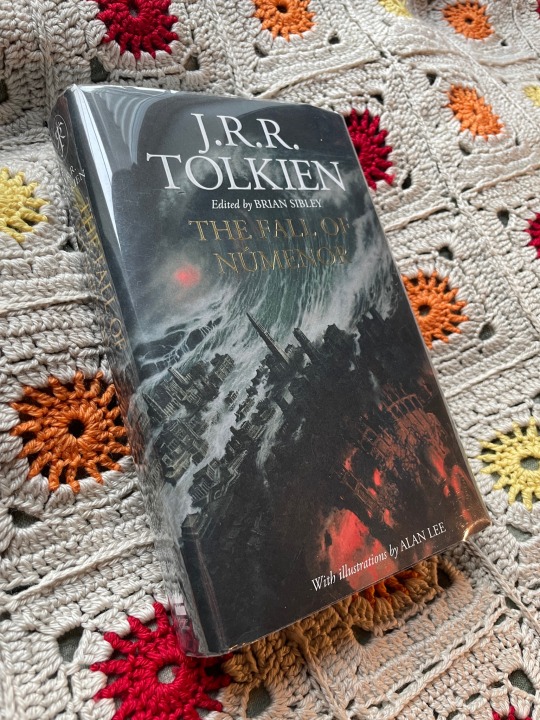#the fall of númenor
Text
Peep at my lil Tolkien Shelves.

#tolkien#jrrtolkien#silmarillion#lord of the rings#unfinished tales#history of middle earth#beren and lúthien#the fall of númenor#the fall of gondolin#the hobbit#the children of húrin#the nature of middle earth#lotr lego#roverandom#bookshelf#tolkien shelf
38 notes
·
View notes
Text

Absolutely obsessed with this illustration of Sauron in The Fall of Númenor. Would you just look at this sleekit bastard! You can practically hear the wheels going round and round in that foul little mind of his. :D
11 notes
·
View notes
Text
Hi I made a little thing! For Tolkien gen week! It's writing! for an incredibly obscure character
Day 1- Family, Mentorships, Community / Day 5- Culture, Diversity, Traditions
Tar-Ancalimë- Daughter of Ill-Pairing
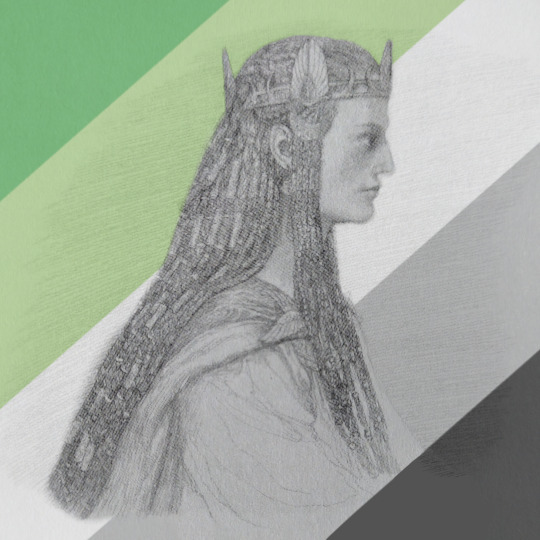
@tolkiengenweek :)
(story below cut)
Her father had gone off to sea again for the last time, and her mother thought now of drowning herself in it. Her father had gifted her the sceptre, and she would only say it was a long time coming, for it had been nothing to him but a heavy plaything. Her father gifted her with it the bulk of his life’s dissatisfaction, and now it was hers upon her strong and unhappy hand. She held it well, they said, she held it like a man. She dearly hoped they were wrong.
Tar-Ancalimë fingered again the crown of silver and gold, pondering the slight ache of its wearing, the unforgiving shape of it. She must always wear her hair in tight and thick braids if this was to fit on her, which she did not mind. It was much preferable to the life of decorum and dust that was to be a princess, and she would rather run away into the hills than have her hair arranged like a fruit bowl every day. She was much too old for that, and so long had she waited for it to finally sit on her head that much of the novelty had already worn off.
She took the crown at least in part just for the satisfaction of her ego, and the knowledge that she would be a far better ruler than anyone else in the line of long-lasting childhood. She took the crown for many reasons- and it was another reason perhaps never to return to hateful Emerië. She had tried all other professions, and none suited her. Númenor was just not exceedingly large, and she had remained a princess whether she abided as a shepherdess or a wild thing in the woods, whether she covered her face in dirt or cut her braids and wore men’s clothing. The men saw her, and knew her, and still called her beautiful. Ancalimë did not understand the meaning of the word, and never wished to. Suitors spoke of her long, thick braids and deep olive skin, her dark lips, her long and regal nose, how she glowed when wearing white and gold. In her face, she only saw her mother and father, as everywhere else.
So a queen she would be instead, and here she returned, and knelt like a soldier to receive the crown. As soon as it was upon her head, she told her father to go play off at sea. It was as if she had severed his chains, and he smiled, and was soon gone.
Her rooms were still here, in the palace, and she returned to them now, with a bitter and cloying feeling. When her father had returned the first time, he had been much surprised to realize his child continued to exist in his absence, and had bidden her to Armenelos, away from her home in the country. He had given her everything. The rooms were grand and decorated and filled for her with things she did not like, or at least had not liked since she had been very small. There were useless gifts made of the gold of Middle Earth, gifts of the grey-elven peoples, worthless souvenirs of places she had little interest in. Aldarion thought they would make her happy, in some convoluted way. Aldarion thought perhaps they would make her his daughter, and not the daughter of Erendis.
Perhaps if she had been raised the son of Aldarion, they might have. If she had grown up at sea in the company of merry and singing men, eating salted crap, waving to foreign forests and elves who had not left them since before the rising of the sun, running from all responsibility- Maybe then she would have been happy, taken up a sword and drawn blood of strangers, and grown to be a senseless king, quickly siring an heir and leaving all care of it and the woman to someone else.
But in this world, she was her terrible mother’s terrible daughter. In this one her father left again, and she was only glad for it. She had explored all other pathways, and all only led again here.
The room had been redecorated long ago, but now the wallpaper began to peel, and beneath it still lay a pattern of twin birds, stained and filled with dust.
Ancalimë turned to the maid beside her, looking upon the rooms. “Now that I am finally queen, I may leave this place for the royal chambers, correct? It is not as if my parents have ever used them.” She surveyed the chamber she had inhabited through her adolescence, and would be glad to leave it, having few happy memories or well-slept nights within. “I would like to enjoy a larger bed and higher view. Those rooms may grant me a far glimpse of my homeland, instead of the sea.”
It was a bittersweet thing, of course. Her father had ruined the sea, her mother had ruined the northwoods, her father had ruined the trees. Everyone upon Númenor had ruined the pastures, but the palace was little better. She could not answer if questioned how this made sense to her. The place where she had power remained the best option, as she had roamed the whole island and found only more of her parents and the endless politics of marriage. Never again to the pastures would she return, nor would she speak to her mother, and she would not learn of her death until far after it had occurred. Neither would she weep, until she had barricaded herself somewhere far away, for her mother would curse her name if she had bent to weeping.
(She would do it anyway, no matter how her mother had ruined her.)
They would return to the sea, and she would stay on land, stubborn and unforgiving.
The maid pursed her lips, and threaded her hands together. “Oh, well, your highness, not yet, see- the royal chambers are only for a wedded king and queen. Surely you may enjoy them as soon as you have found a suitable man, but until then you will not have need for more than a maiden’s chambers.”
Ancalimë narrowed her eyes. “It’s your majesty.”
The maid looked down. “I am sorry, I am just unused to it is all. We have never had a queen ruler, and I have known you so long.”
Ancalimë seethed and set off down the hall, and the maid followed. “I am not a maiden. I am two hundred years old, and I have waited long enough to have my way. I will not marry. There is no one whom I would marry, and I truly do not expect that to change.”
Her maid was now bent with age, and unmarried as well, for she dismissed any that chose to. But the little lady bowed her head and sighed. “Now surely that is unwise. No one would wish you rule without a king.”
“Well then the land shall be disappointed, for this is my rule, and no one else’s.”
“But do you not wish for love?” the maid asked, grieved. “You are lonely, I know this. You talk to yourself. You wander at night, and never speak to your family except to bid them leave.”
She made her way to the balcony, and wished to be left alone, if nothing else, if somehow the highest office in the land would still not let one live as they wished. When she had been young, Aldarion had once promised she would have everything she had ever wanted. Aldarion appeared to think she wanted different things, for now she was only less free than ever before.
“I am not lonely. You see me talking little because every man who has ever dared to speak with me wishes only to take me as his wife,” she shouted, and kicked open the balcony’s doors. “I do not wish for love, and I do not understand anyone who would. I ask you, for neither are you married. Would you truly wish to give up your autonomy? To share your secrets, your bed, your own body and heart? It seems to me that all lovers have caught a disease I want no part in. I see what it has done to my mother.”
The maid set a hand on her shoulder, and smiled sadly. “I am not married, yes, but I would be if I could. Not all love is as unhappy as that which you come from. I have lived long with my lover, and I would not give her up.”
The queen looked out upon her kingdom, and still did not understand. “I am glad you are happy where my parents were not. But I would not have a woman in my bed either. I enjoy sleeping, and I enjoy being alone. Two things I am already exceptionally deprived of.”
The wind was fair, the sky was clear and the city streets were still decorated for her coronation, though very few were happy to see her take her due, and a thousand relatives and suitors had not yet gotten the order to vacate the palace at once. Far away to the west, Gil-Estel glittered, and was a guide only for those that ventured at sea. It was ever silent to her.
In her hand was a piece of paper now older than half the men in the capitol, and on it was a list, written by her at the tender age of fifteen. She looked down to the maid, who had followed her anyway, and held it up, reading it aloud in a strong and bitter voice.
“Rules I am going to make when I am queen.” She looked down, reading the bulleted list. “Number one, divorce is legal. Number two, my father has to get one. Three, all my servants get free horses and we ride them every day.” Ancalimë turned red, moving on to the next one. “Four, I never have to get married and no one is ever allowed to bother me about it ever again.”
The list went on, for an embarrassingly long while.
“It appears that most of these things are beyond my reach even now. Already my cousins call me to surrender my crown.” She narrowed her eyes. “But it is mine, and as long as I can I will live how I wish. Tradition means nothing to me, and my father is not here. This is my palace, and I shall sleep in the royal chambers. Alone. You may inform the rest of the staff of this order. I am tired.”
The maid frowned, bowing and hurrying away. Ancalimë threw the list to the wind, and closed the door, walking with head held high, holding still to her dwindling ground, high above all others.
The weight of the family hung like cobwebs upon her crown. The decisions of Elros were not hers. No legends ever taught made space for such a queen. When she had as a child walked through these massive libraries, all stories of the ancients were love stories.
Her mother had told her when she was young that Númenor was no place for a sane woman, and all was but a collection of the power fantasies, the land of gift to happy men. Her mother told her she would never be happy. But her mother had told her many things, and most were nonsense.
Perhaps the land of gift was not made for her, nor would it remember her well. But she inherited it whether anyone wished her to or not, and Tar-Ancalimë would live as she willed.
Far away on the open sea, Aldarion spent his last days on stormy waters, free as a child, and knew he should never have married. Near enough, on the ports of Rómenna, Erendis stood again as a sailor’s wife, and did not speak nor weep, grey and spent on nothing she had been able to keep. Though free of the house of Elros she would never be, the daughter of the ill-pairing would never suffer from such an affliction, and did not grieve it one bit.
#rowan screams into the void#tolkiengenweek#tar-ancalime#the fall of Númenor#this is the first time ive ever actually finished something in time to post it for one of these challenges damn (wrote this all today)#i might post this on ao3 but idk its short#and this isnt really something many people care about
38 notes
·
View notes
Text
I'm not a Fëanorian apologist, I'm a Númenórean apologist. Yeah Pharazôn was a dick but they were basically gaslit by Ilúvatar and the Valar. Also why did nobody step in to deal with Sauron, but straight up destroying the island was an appropriate solution?
90 notes
·
View notes
Text
The Fall of Númenor, page 30
The people, tall and strong, were agile, and extremely ‘aware’: that is they were in control of their bodily actions, and of any tool or material they handled, and seldom made absent-minded or blundering movements; and they were very difficult to take ‘off their guard’. Accidents were thus unlikely to occur to them. If any did, they had a power of recovery and self-healing, which if inferior to that of the Eldar, was much greater than that of Men in Middle-earth. Also among the matters of lore that they specially studied was hröangolmë or the lore of the body and the arts of healing.
Sicknesses or other bodily disorders were very rare in Númenor until the latter years. This was due both to the special grace of health and strength given to the race as a whole, but especially due to the blessing of the land itself; and also in some measure no doubt to its situation far out in the Great Sea: animals were also mostly free from disease. But the few cases of sickness provided a practical function, so far as one was needed, for the continued study of hröangolmë (or physiology and medicine) in which the practisers of simple leechcraft --
-- Leechcraft! --
-- among the Edain had received much instruction from the Eldar, and in which they were able still to learn from the Eressëans, so long as they would.
Someone gets sick or suffers an injury and immediately all physicians on a 50km radius rush to their house, fighting for the privilege of taking care of the convalescent?
Physicians injuring themselves or getting sick on purpose, in order to try out their own theories?
In the first days of the coming of Númenórean ships to the shores of Middle-earth [beginning in year 600 of the Second Age] it was indeed their skill in healing, and their willingness to give instruction to all who would receive it, that made the Númenóreans most welcomed and esteemed.
It's just a small paragraph that can mean many things; for my part, I'm considering how much of a social movement this could be... Suddenly "physician" becomes less of a virtual profession and opens to material possibility... IDK, it's kind of wild
11 notes
·
View notes
Text

The Fall of Númenor - J. R. R. Tolkien; Ed. By Brian Sibley
Read: Jan - Feb 2023
This was a great piece of work for me. It lays out the history that Tolkien had written for the Second Age of Middle-earth. Which had always been a big opaque for me. This was a fun read. I loved learning more about Middle-earth. And of course this really showed how wild the Rings of Power TV show was. Completely off the book. I mean I did know that already but it was fun to have it confirmed with the publication of a whole book. But yeah unless you are into the lore of Middle-earth this is probably not the book for you. But if so, then this is a great book!
Info: HarperCollins, 2022
#the fall of númenor#j.r.r. tolkien#jrr tolkien#brian sibley#fiction#fantasy#history of middle earth
7 notes
·
View notes
Text
#Polls#poll#eglerieth#tolkien#aldarion#tar aldarion#Tar-aldarion#Anardil#fall of Númenor#Aldarion and Erendis#silmarillion#lotr#lord of the rings
6 notes
·
View notes
Photo


Alan Lee, cover illustration for The Fall of Númenor: And Other Tales from the Second Age of Middle-Earth, by J. R. R. Tolkien, edited by Brian Sibley (William Morrow, November 15, 2022).
__________________________________________________
Our shop: https://bookshop.org/shop/manyworldspress
#alan lee#J. R. R. Tolkien#the fall of numenor#númenor#Middle-Earth#tolkien’s legendarium#fantasy art#pub day
52 notes
·
View notes
Text
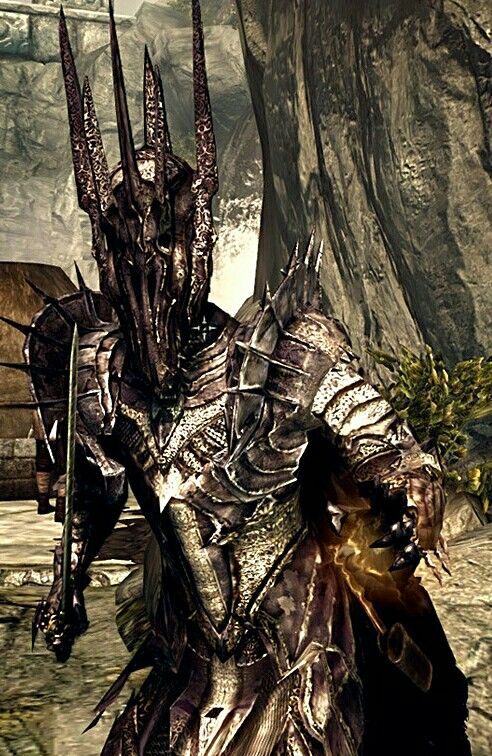
"...HE WROUGHT HIMSELF A NEW GUISE, AN IMAGE OF HATRED AND MALICE MADE VISIBLE..."
PIC INFO: Spotlight on an illustration of Sauron, the Dark Lord and Enemy of the Free Peoples of Middle-earth, as he appeared during the Battle of Dagorlad in Peter Jackson's "Lord of the Rings" film trilogy (2001-2003). Artist unknown.
"...his spirit arose out of the deep and passed as a shadow and a black wind over the sea, and came back to Middle-earth and to Mordor that was his home. There he took up again his great Ring in Barad-dûr, and dwelt there, dark and silent, until he wrought himself a new guise, an image of malice and hatred made visible; and the Eye of Sauron the Terrible few could endure."
-- "QUENTA SILMARILLION," "Akallabêth," written by J.R.R. Tolkien, published 1977
Sources: www.pinterest.com/pin/488218415837584309 & www.henneth-annun.net/events_view.cfm?evid=1060.
#Sauron#The Second Age#Second Age#Land of Mordor#Fellowship of the Ring#In the Land of Mordor Where the Shadows Lie#Sauron Armor#The Lord of the Rings#Middle-earth#The Fellowship of the Ring#The One Ring#The Battle of Dagorlad#Plateau of Gorgoroth#Fall of Númenor#Barad-dûr#Battle of Dagorlad#LOTR#Lord of the Rings#J.R.R. Tolkien#Tolkien#Battle of the Last Alliance#The Dark Lord
3 notes
·
View notes
Text
thinking abt Sauron’s hair getting whiter like hot metal as the Ages progress because his ire grows bigger with each passing day
#as in it was red/orange back in the 2nd Age or something#and then it got slowly more yellow as things kept progressing and his ego got bigger lol#and it ended in white possibly between the Fall of Númenor when he was at his most idiotic for pulling that stunt off#also ig that would make him look like he was older because haha evil somehow making First Borns age or whatever idk man#merry habla#Silmarillion
6 notes
·
View notes
Text
!!!
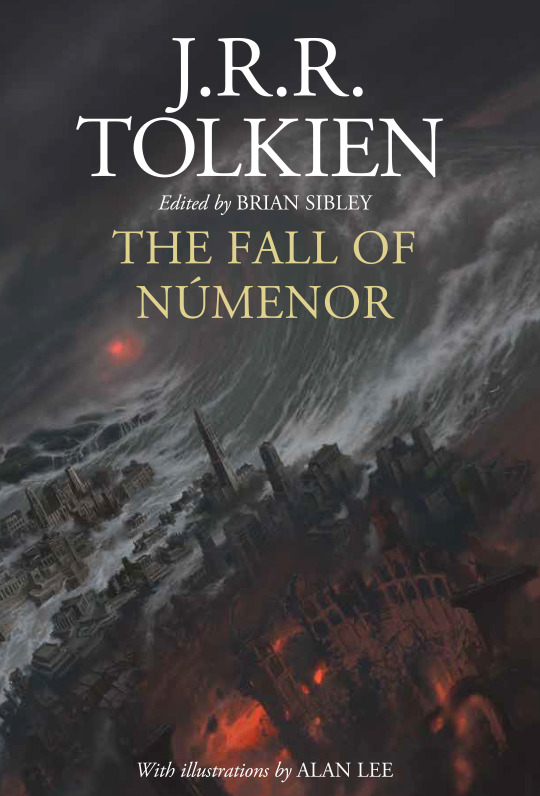
So apparently The Fall of Númenor is going to be published in November! I’m EXCITED. I was driving home two and a half years ago, randomly thinking that I was hoping that Christopher Tolkien would (again) deviate from what he’d said in the preface to The Fall of Gondolin re: this being the last work of his father’s that he’d edit, and go to publish the Númenor material in a single tome, too. And the next day I found out that he’d passed away. But now the book is coming anyway! Forgive my excited rambling, but that makes me so happy.
#the actual second age#númenor love#númenor is falling down#gratuitious tolkien reference#can't wait
10 notes
·
View notes
Photo


Coberta de la primera edició de The Fall of Numenor (La caiguda de Númenor), escrita per en Brian Sibley i amb iŀlustracions de n’Alan Lee.
#art#pintura#iŀlustració#llibre#coberta#La caiguda de Númenor#The Fall of Numenor#Brian Sibley#Alan Lee#2022#Tolkien#Númenor
5 notes
·
View notes
Text
The Fall of Númenor and Other Tales from the Second Age of Middle-earth by J.R.R. Tolkien
Title: The Fall of Númenor and Other Tales from the Second Age of Middle-earth. Writer(s): J.R.R. Tolkien.Editor(s): Brian Sibley.
Publisher: William Morrow.Format: Hardcover.Release Date: November 15th, 2022.Pages: 296.Genre(s): Fantasy.ISBN13: 9780063280687.
My Overall Rating:
⭐⭐⭐⭐
Rating: 3.5 out of 5.
“These were the dark years for Men of Middle-earth, but the years of the glory of…
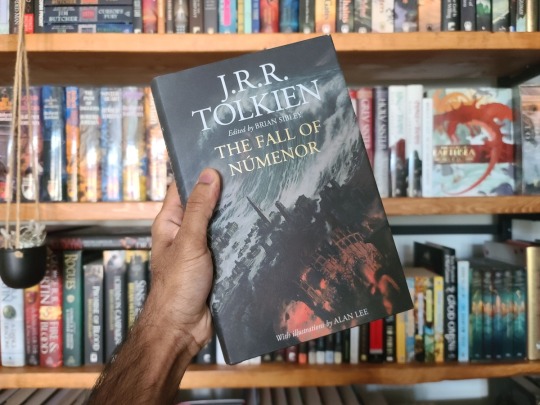
View On WordPress
#book#book blogger#bookworm#brian sibley#fantasy#j.r.r. tolkien#middle-earth#review#The Fall of Númenor: and Other Tales from the Second Age of Middle-earth
0 notes
Text
One thing that really bothers me is that they have made Elendil a "petty lord", seemingly a nobody who is swept up by the story.
First of all, if Amandil is dead, Elendil is the Lord of Andúnië, a cadet branch of the Royal Family via Silmariën, daughter of Tar-Palantir, fourth king of Númenor. And then he's also related to Míriel and Pharazôn. The latter was said to be close with Amandil in his youth, so him not knowing who Elendil is just doesn't track for me.
Besides, the Lord of Andúnië was supposed to be the most senior member of the King's Council, and the chief adviser. They are the most important aristocrats after the Royal Family. It is a plot point that they are the leaders of the Faithful.
I'm okay with Míriel having more agency, because what happened to her in canon is horrible and reeks of misogyny, but I'm bothered by this meaning Elendil and his family have diminished political power.
#the rings of power#trop#númenor#elendil#míriel#can you tell that i am obsessed with Númenor since i was a teen#and the fall of Númenor is the first volume i ever read of the History of Middle Earth series
35 notes
·
View notes
Text
lighting review of The Fall of Númenor:
purpose: to create a coherent account of Númenor while at the same time not discarding anything?
objective problems: confusing, badly sourced, too many typos and even wrongly copied quotes
bonus: cute ideas here and there; beautiful illustrations by alan lee
additional PERSONAL OPINION DISCLAIMRE thoughts:
The value of the HoME is not just in the content it offers, but the historiographical approach to that content: Chris Tolkien makes it very clear what comes from when and comes from where, what changes, what remains. It's a work that puts the conflicts, contradictions, changes and developments in evidence.
This work is the opposite. Not only it doesn't seem to care for the different context between the parts it incorporates, it also does not wish for the reader to care, either. I mentioned things are badly sourced, but it's also relevant to mention that the author takes bits and pieces from contradictory versions and stitches them together, with no warning to the reader. So that, for example, you have a Míriel who was in love with Pharazôn, but who was also unwillingly married, and usurped by him. This could be a very interesting fan approach to the story; it irks me that it is not presented as that. In fact, this book is presented as a compendium of everything ever written about Númenor; that is simply not true.
What it actually does is try to create a coherent narrative of Númenor from its creation to its destruction. That's a goal I can respect in theory, but it is, essentially, a fan work. It might be worthwhile for some, but it definitely isn't for me. I don't like the premise and I hate the execution (and I'm beyond disappointed, because I would have loved to have an actually useful compendium of Númenor information).
(ALSO. If that's the objective, to create a coherent narrative, and if the author is going to have the power to decide which bits to nip and tuck in order to pass this Frankenstein for an Adonis, then why not also do away with some of the most unsavory bits -- such as how the men in Middle Earth supposedly forgot how to talk, and had to be saved from their bestial grunting-and-groaning by the Númenoreans? Like. Just asking)
my veredict: do not recommend :p
14 notes
·
View notes
